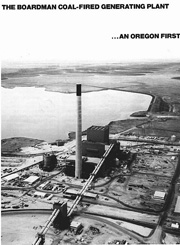Earthrise - Law School - Lewis & Clark
Sierra Club, et al., v. PGE Settlement Locks In Oregon’s Clean Energy Future

On July 19, 2011, we announced the end of the campaign, having penned a Consent Decree that provides for an end to coal at Boardman by the end of 2020. Having PGE’s promise to shut down Boardman in a court decree allows the parties to enforce that date against PGE—even if DEQ’s rules change.
The settlement also decreases sulfur dioxide pollution by at least 3,000 tons beyond the limit called for by current rules, and creates a $2.5 million charitable fund at the Oregon Community Foundation. This fund, called the Penstemon Fund, provides money for land acquisition and habitat restoration in the Columbia River Gorge, Hells Canyon, and Eagle Cap, investment in community based renewable energy generation projects, and funds for clean air advocacy.
To reach this favorable result, Earthrise attorneys, twenty-four Earthrise students, and our co-counsel George Hays invested over four years, over 5,000 hours of legal work, and over $100,000 for experts, depositions, and other litigation costs. Earthrise students worked with the attorneys to review millions of pages of documentary evidence, take eight depositions and propound over one hundred discovery requests. Earthrise students were essential to our ability to manage the extensive discovery in the case, and learned to use cutting-edge document management systems to handle the overwhelming amount of documentary evidence. PGE hired national firm Baker Botts to defend the suit, and eleven big firm attorneys filed appearances for the defense. Baker Botts produced expert reports from five separate experts.
The parties filed four substantive pretrial motions, with Plaintiffs prevailing over PGE in all motions decided by the court, including a substantial motion to dismiss, a contentious motion to amend the complaint, and a complicated motion to strike Plaintiffs’ discovery responses. Earthrise students researched and wrote the first and subsequent drafts of the majority of the filings in the case, with the attorneys providing extensive feedback. Earthrise students also prepared the attorneys for oral arguments, and attended high-pressure settlement talks.
The federal citizen suit was only one part of a multi-prong strategy to make Oregon coal-free. Earthrise was primary counsel in each prong, including: intervention at the Public Utility Commission in Portland General Electric’s integrated resource planning docket; participation in the Oregon Department of Environmental Quality’s rulemaking to reduce regional haze impacts on federally protected parks and wilderness areas; and a comprehensive public campaign in Oregon and Washington.
Taken together, these matters imparted unprecedented opportunities for student learning. Earthrise students were intimately involved with every aspect of the matter. Of the twenty-four Earthrise students who worked on the case, many have gone on to use the skills and experience gained in the Boardman case in their litigation careers.
Earthrise Law Center is located in Wood Hall on the Law Campus.
MSC: 51
email earthrise@lclark.edu
voice (503) 768-6736
fax (503) 768-6642
Allison LaPlante
Earthrise Law Center
Lewis & Clark Law School
10101 S. Terwilliger Boulevard MSC 51
Portland OR 97219